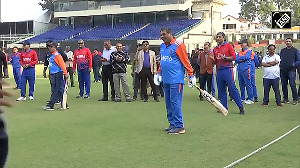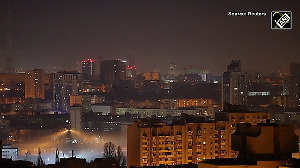China's sporting red army continued its relentless acquisition of Asian Games titles on Tuesday, scooping up a phenomenal 22 gold medals including the men's badminton team crown.
World number one Lin Dan lost the opening singles match in the final against South Korea but his team mates rallied to win 3-2 and reclaim the blue riband title for China for the first time in 16 years.
"It is very fulfilling to have done it as a player and again as the coach," said Li Yongbo, a member of the last victorious China team in Beijing in 1990.
"This success does not look perfect, but 3-0 is not good for the players in terms of training."
The women shuttlers, led by world number one Zhang Ning, won their team title 3-0 against Japan while the prolific Chinese shooting team enjoyed another stellar day at the firing range, bagging seven golds.
A sweep of the cycling time trials, three golds in the gymnastics, a couple from women's judo and another in women's weightlifting helped the Chinese to a total of 59 golds after four days of the 15-day festival of sport.
Japan matched China gold-for-gold in the pool to remain second on the medals table ahead of South Korea, whose teenage sensation Park Tae-hwan claimed his second swimming title with a convincing win in the men's 400m freestyle title.
"I'm satisfied with the gold medal, but the time could have been better," said the 17-year-old. "I meant to go out faster at 200 and 300 metres. I made a mistake with my pace ..."
Kazakh strongmen Vyacheslav Yershov and Ilya Ilin ended China's domination of the men's weightlifting at the Al Dana banqueting hall by winning golds in the light-heavyweight and middle-heavyweight classes.
"I am happy to stop their winning streak," Yershov grinned as he left the banqueting hall, mobbed by team mates. "It is high time for one person to do this -- I am happy it was me."
Kazakhstan also scored their fourth shooting title in the men's 10m running target team competition to remain best of the rest on the medals table behind the three East Asian powerhouses with eight gold medals.
SENSATIONAL LEG
With 10 of their 17 gold medals coming from the pool, Japan have already equalled their swimming haul from the last Games in Pusan with two days of competition remaining.
Asami Kitagawa beat defending champion Ji Liping of China by 0.34 to win the 100m breaststroke, while a sensational final leg by Daisuke Hosokawa helped the Japanese 4x100m freestyle quartet to a new Asian record of 3:18.95.
The Chinese looked all set for victory but Hosokawa came storming through with 25m to go to pass Qu Jingyu in the closing stages.
China's head coach Zhang Yadong was less than impressed.
"That failure will be a blow to the whole team," he said. "That shouldn't have happened. Qu was overwhelmed even before he entered the water. Maybe we shouldn't have put him on the final leg."
DISAPPOINTING HAUL
The Chinese men have won only two swimming golds while the women have won 10, a disappointing haul for the Chinese who see the Asian Games as a key indicator of their progress in preparations for the 2008 Beijing Olympics.
"Initially we planned to win 20 gold medals here, but there's little chance of that now," said Zhang.
Cyclist Li Meifang retained her women's individual time trial crown on the Al-Khor road course, finishing 52 seconds clear of her nearest rival, while newcomer Song Baoquing took an unexpected first career title in the men's race.
Kazakhstan's Zulfiya Zabirova finished second behind Li and was surprised by the pace of the Chinese.
"The fight was between us," said Zabirova, whose silver medal was Kazakhstan's first on the road at the Asian Games.
"I've seen her a few times at international competitions, but she has never performed like this."
While the well-prepared, well-funded Chinese machine rumbled on towards overhauling its record 183 golden haul from the 1990 Asian Games, Iraq's 10-year-old Amer Ali gave a glimpse of the other side of sport in Asia.
"It's difficult for our athletes to train," the Games' youngest competitor said after swimming alongside some of the continent's finest swimmers. "Many times, the police and the army don't allow us to leave our homes or move around freely."








 © 2025
© 2025